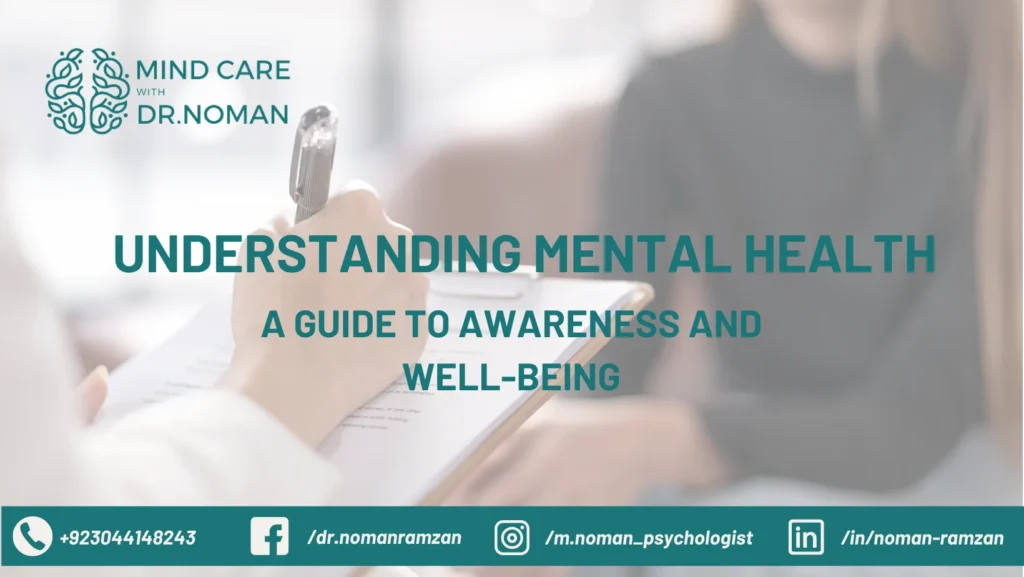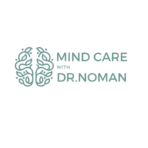Mental health is an essential aspect of our overall well-being. It influences how we think, feel, and behave. It also impacts how we handle stress, relate to others, and make choices. While mental health is often overlooked in comparison to physical health, its importance cannot be overstated. In fact, mental health disorders affect a significant portion of the population worldwide, with anxiety and depression being among the most common. In this article, we will explore common mental health conditions, the stigma surrounding them, and how seeking help and practicing self-care can help improve mental well-being.

Introduction
The Importance of Mental Health
Mental health plays a vital role in the quality of our lives. It affects everything from our relationships to our productivity and happiness. Poor mental health can lead to challenges in personal, professional, and social aspects of life. It’s important to remember that mental health issues are not a sign of weakness but a sign that something is not functioning well, just as we would treat any other physical condition.
Mental health encompasses our emotional, psychological, and social well-being. It can affect anyone regardless of age, gender, or background. However, mental health remains a taboo subject in many cultures, causing people to ignore or hide their symptoms rather than seek help.
Common Mental Health Conditions
Anxiety Disorders
Anxiety disorders are among the most common mental health issues worldwide. Anxiety is characterized by feelings of fear, worry, or nervousness that can be overwhelming. While it’s normal to feel anxious in certain situations, such as before a big presentation or exam, anxiety disorders cause excessive and persistent feelings of fear that interfere with daily life.
Common types of anxiety disorders include Generalized Anxiety Disorder (GAD), Social Anxiety Disorder (SAD), and Panic Disorder. People with these conditions often experience physical symptoms such as rapid heartbeat, sweating, trembling, and difficulty breathing.
Coping Strategies
- Deep breathing exercises
- Mindfulness meditation
- Regular exercise
- Cognitive Behavioral Therapy (CBT)
Depression
Depression is another prevalent mental health disorder that affects millions of people globally. It involves persistent sadness, hopelessness, and a loss of interest in activities once enjoyed. Depression can have a significant impact on one’s ability to function and can lead to feelings of isolation, low energy, and difficulty concentrating.
Symptoms of depression can vary from person to person, but common signs include:
- Persistent sadness or low mood
- Loss of interest in activities
- Fatigue and lack of energy
- Sleep disturbances (insomnia or oversleeping)
- Thoughts of self-harm or suicide
Treatment Options
- Psychotherapy (e.g., CBT)
- Antidepressant medications
- Lifestyle changes (regular exercise, better nutrition)
Stress-Related Disorders
Stress is an inevitable part of life, but when it becomes chronic, it can lead to mental health issues. Prolonged stress can lead to conditions like Post-Traumatic Stress Disorder (PTSD), burnout, and other anxiety-related disorders. Chronic stress affects both the mind and the body, leading to anxiety, depression, and physical health problems.
Tips for Stress Management
- Identify the sources of stress and try to eliminate them.
- Practice time management and set boundaries.
- Develop a support network of family and friends.
- Try relaxation techniques, such as yoga or meditation.
The Stigma Surrounding Mental Health
Understanding Mental Health Stigma
Unfortunately, mental health issues are often met with stigma and discrimination. Many people hesitate to seek help because they fear judgment or misunderstanding. This stigma is rooted in negative beliefs about mental illness and the misconception that individuals with mental health issues are weak or incapable.
Stigma prevents people from accessing the support they need, leading to prolonged suffering. Research shows that individuals who experience stigma are less likely to seek treatment and more likely to suffer from poor mental health outcomes. This is why it is crucial to talk openly about mental health, educate others, and work to break down the barriers created by stigma.
Strategies to Combat Stigma
One of the most effective ways to combat mental health stigma is through education. The more people understand about mental health, the more likely they are to support those experiencing difficulties.
- Open Conversations: Encourage open discussions about mental health in homes, schools, and workplaces.
- Public Awareness Campaigns: Raise awareness about mental health issues through media and community outreach.
- Normalize Therapy: Just as people seek medical attention for physical ailments, therapy for mental health should be normalized and encouraged.
Additionally, we can all play a part in changing how we perceive mental health. Be supportive and non-judgmental when a friend or loved one seeks help.
Seeking Help and Support
When to Seek Professional Help
Mental health issues can be overwhelming, but there is help available. It’s essential to recognize when professional assistance is needed. If you or someone you know is struggling with mental health challenges, it may be time to consult with a mental health professional.
Signs that professional help may be needed:
- Persistent feelings of sadness or anxiety
- Difficulty coping with daily life
- Thoughts of self-harm or suicide
- Social withdrawal
- An inability to function in daily tasks or at work
Therapists, counselors, and clinical psychologists can offer various forms of treatment, including psychotherapy and behavioral therapy, which can help individuals learn how to manage their symptoms and improve their mental well-being.
Available Resources
In Sargodha, Punjab, Pakistan, there are several resources for those seeking mental health support:
- Local Psychologists and Therapists: Many licensed psychologists offer individual counseling and therapy sessions.
- Online Therapy Platforms: For those unable to attend in-person sessions, there are various online platforms offering virtual therapy.
- National Helplines: Pakistan offers several mental health support helplines to provide immediate assistance and counseling.
Consulting with a professional will provide personalized treatment plans to address your specific needs and ensure that you receive proper support.
Self-Care and Coping Strategies
Importance of Self-Care
Self-care is an essential part of maintaining good mental health. It refers to any activity that we engage in to take care of our mental, emotional, and physical well-being. Taking time for self-care can help reduce stress, improve mood, and prevent mental health issues from worsening.
Self-care activities can range from taking a walk in nature to spending time with loved ones or practicing mindfulness.
Practical Self-Care Tips
- Prioritize sleep and rest
- Eat a balanced diet rich in nutrients
- Engage in regular physical activity
- Limit screen time, especially before bed
- Engage in hobbies and activities that bring joy
Coping Mechanisms
Coping strategies are techniques that help individuals manage stressful situations and emotional challenges. Effective coping mechanisms allow individuals to navigate life’s difficulties without becoming overwhelmed.
Some coping strategies include:
- Mindfulness: Practice mindfulness techniques to stay grounded and present in the moment.
- Deep Breathing: Use deep breathing exercises to manage stress and anxiety.
- Social Support: Reach out to friends and family for comfort and understanding.
- Journaling: Writing about emotions and experiences can help process difficult feelings and reduce stress.
Conclusion
Mental health is an integral part of our overall well-being, and raising awareness is the first step toward breaking down barriers and reducing stigma. By understanding common mental health conditions, challenging negative stereotypes, and learning about coping strategies and self-care, we can all contribute to a healthier society.
If you are struggling with mental health issues, remember that you are not alone. It’s okay to seek help, and it’s a brave step toward improving your life. If you’re in need of professional support, don’t hesitate to reach out.
For personalized support and guidance on mental health, you can consult Dr. Noman Ramzan, an experienced clinical psychologist with over four years of experience in helping individuals improve their mental well-being. Dr. Ramzan offers therapy sessions tailored to meet your unique needs and helps you manage stress, anxiety, and depression effectively.


